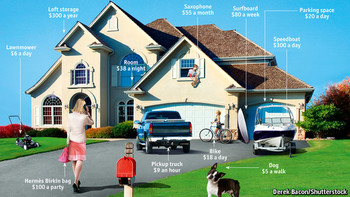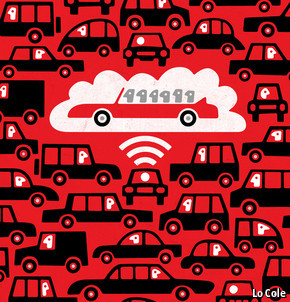これからはシェアリング・エコノミー「共有型経済」の時代だ [経済]
Peer-to-peer rental
「1対1のレンタル」
The rise of the sharing economy
「シェアリング・エコノミーの台頭」
On the internet, everything is for hire
「インターネットでは何でもレンタル出来る」


★イギリスの経済専門誌エコノミストが最近の記事で「シェアリング・エコノミー( Sharing economy)」について取り上げていました。
Sharing economyは日本語に訳すと「共有型経済」となりますが、インターネットの情報力を使いながら、消費者同士が1対でモノ、サービス等を貸し借りする仕組みのことで、欧米などでここ2,3年に急速に拡大しているようです。
記事の中では次のように説明しています。
It is the most prominent example of a huge new "sharing economy", in which people rent beds, cars, boats and other assets directly from each other, co-ordinated via the internet.
「個人がインターネットを通じて協力し合い、宿泊場所や車、船などの個人の資産を直接貸し借りする経済の仕組み」
こうしたshraring economyという概念が出てきた背景には、人々がモノを所有することよりも使うことに重点を置き、使わない資産を活用して少しでもお金を稼ぐことに意味を見出したこと、そしてインターネットの活用や、ソーシャルネットワークの発達のおかげで、より簡単に取引相手を見つけることができるようになったことが大きいようです。
これまで「カーシェアリング」とか、「ワークシェアリング」などという言葉が聞かれましたが、これからの時代は消費者同士がモノやサービスの貸し借りをするというsharing economyが当たり前のようになるのでしょうか。
このsharing economy, 記事の中ではcollaborative comsumption「協調的消費」, consumer peer-to-peer renta「消費者同士によるレンタル」lなどとも表現しています。
sharing economyのメリットとは
Owners make money from underused assets
「所有者は使っていない資産でお金を稼げる」
このsharing economyはまだ始まったばかりですが、15年ほど前に普及してきたオンライン・ショッピングと似ているところがあると記事の中で指摘しています。
当初、消費者はオンラインでものを購入することの安全性について一抹の不安を抱いていましたが、次第に安全にモノを買うことが出来るという評判が出てくると急速に広まっていった。これと同じことがsharing econonyについても言えると書かれています。
★エコノミストの記事は、最後に次のように述べてsharing economyの発展に大いに期待を寄せているようです。
The sharing economy is the latest example of the internet’s value to consumers (see Free exchange). This emerging model is now big and disruptive enough for regulators and companies to have woken up to it. That is a sign of its immense potential. It is time to start caring about sharing.
「sharing economyはインターネットが消費者にもたらす価値の最新事例と言える。この新たなモデルは巨大で破壊的な力を持ち、今では規制当局や企業も関心を向けるようになった。それは「共有型経済」には計り知れない可能性があることを示している。今こそ、sharing に目を向けるべき時なのだ。」
はたしてsharing economyはオンライン・ショッピングと同じように消費者の間に普及していくのでしょうか。
★sharing economyについて興味のある方は、以下のサイトが参考になると思います。
Airbnb
シェアリングエコノミーで生計を立てる未来の生き方
Will you leave your job to join the sharing economy?
★今回のエコノミストの記事の日本語翻訳は以下で読むことが出来ます。
P2Pレンタル:シェア経済の興隆(JB PRESSより)
「英文記事」
LAST night 40,000 people rented accommodation from a service that offers 250,000 rooms in 30,000 cities in 192 countries. They chose their rooms and paid for everything online. But their beds were provided by private individuals, rather than a hotel chain. Hosts and guests were matched up by Airbnb, a firm based in San Francisco. Since its launch in 2008 more than 4m people have used it—2.5m of them in 2012 alone. It is the most prominent example of a huge new “sharing economy”, in which people rent beds, cars, boats and other assets directly from each other, co-ordinated via the internet.
You might think this is no different from running a bed-and-breakfast, owning a timeshare or participating in a car pool. But technology has reduced transaction costs, making sharing assets cheaper and easier than ever—and therefore possible on a much larger scale. The big change is the availability of more data about people and things, which allows physical assets to be disaggregated and consumed as services. Before the internet, renting a surfboard, a power tool or a parking space from someone else was feasible, but was usually more trouble than it was worth. Now websites such as Airbnb, RelayRides and SnapGoods match up owners and renters; smartphones with GPS let people see where the nearest rentable car is parked; social networks provide a way to check up on people and build trust; and online payment systems handle the billing.
What’s mine is yours, for a fee
Just as peer-to-peer businesses like eBay allow anyone to become a retailer, sharing sites let individuals act as an ad hoc taxi service, car-hire firm or boutique hotel as and when it suits them. Just go online or download an app. The model works for items that are expensive to buy and are widely owned by people who do not make full use of them. Bedrooms and cars are the most obvious examples, but you can also rent camping spaces in Sweden, fields in Australia and washing machines in France. As proponents of the sharing economy like to put it, access trumps ownership.
Rachel Botsman, the author of a book on the subject, says the consumer peer-to-peer rental market alone is worth $26 billion. Broader definitions of the sharing economy include peer-to-peer lending (though cash is hardly a spare fixed asset) or putting a solar panel on your roof and selling power back to the grid (though that looks a bit like becoming a utility). And it is not just individuals: the web makes it easier for companies to rent out spare offices and idle machines, too. But the core of the sharing economy is people renting things from each other.
Such “collaborative consumption” is a good thing for several reasons. Owners make money from underused assets. Airbnb says hosts in San Francisco who rent out their homes do so for an average of 58 nights a year, making $9,300. Car owners who rent their vehicles to others using RelayRides make an average of $250 a month; some make more than $1,000. Renters, meanwhile, pay less than they would if they bought the item themselves, or turned to a traditional provider such as a hotel or car-hire firm. (It is not surprising that many sharing firms got going during the financial crisis.) And there are environmental benefits, too: renting a car when you need it, rather than owning one, means fewer cars are required and fewer resources must be devoted to making them.
For sociable souls, meeting new people by staying in their homes is part of the charm. Curmudgeons who imagine that every renter is Norman Bates can still stay at conventional hotels. For others, the web fosters trust. As well as the background checks carried out by platform owners, online reviews and ratings are usually posted by both parties to each transaction, which makes it easy to spot lousy drivers, bathrobe-pilferers and surfboard-wreckers. By using Facebook and other social networks, participants can check each other out and identify friends (or friends of friends) in common. An Airbnb user had her apartment trashed in 2011. But the remarkable thing is how well the system usually works.
Peering into the future
The sharing economy is a little like online shopping, which started in America 15 years ago. At first, people were worried about security. But having made a successful purchase from, say, Amazon, they felt safe buying elsewhere. Similarly, using Airbnb or a car-hire service for the first time encourages people to try other offerings. Next, consider eBay. Having started out as a peer-to-peer marketplace, it is now dominated by professional “power sellers” (many of whom started out as ordinary eBay users). The same may happen with the sharing economy, which also provides new opportunities for enterprise. Some people have bought cars solely to rent them out, for example.
Incumbents are getting involved too. Avis, a car-hire firm, has a share in a sharing rival. So do GM and Daimler, two carmakers. In future, companies may develop hybrid models, listing excess capacity (whether vehicles, equipment or office space) on peer-to-peer rental sites. In the past, new ways of doing things online have not displaced the old ways entirely. But they have often changed them. Just as internet shopping forced Walmart and Tesco to adapt, so online sharing will shake up transport, tourism, equipment-hire and more.
The main worry is regulatory uncertainty (see Technology Quarterly article). Will room-renters be subject to hotel taxes, for example? In Amsterdam officials are using Airbnb listings to track down unlicensed hotels. In some American cities, peer-to-peer taxi services have been banned after lobbying by traditional taxi firms. The danger is that although some rules need to be updated to protect consumers from harm, incumbents will try to destroy competition. People who rent out rooms should pay tax, of course, but they should not be regulated like a Ritz-Carlton hotel. The lighter rules that typically govern bed-and-breakfasts are more than adequate.
The sharing economy is the latest example of the internet’s value to consumers (see Free exchange). This emerging model is now big and disruptive enough for regulators and companies to have woken up to it. That is a sign of its immense potential. It is time to start caring about sharing.
(The Economist 2013/03/11)
2013-03-23 06:49
nice!(0)
コメント(1)
トラックバック(0)




Bán TWITTER CỔ REG 2009>2015 - Instagram accounts
Visit
https://accs.vn
by Josueovaph (2021-07-04 07:47)